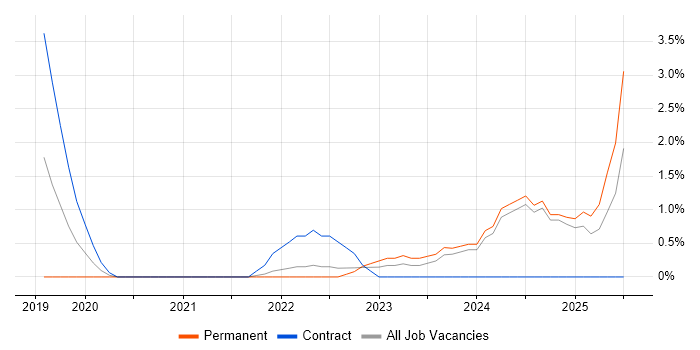Figma
West Yorkshire > Bradford
The table below provides summary statistics for permanent job vacancies advertised in Bradford requiring Figma skills. It includes a benchmarking guide to the annual salaries offered in vacancies that cited Figma over the 6 months leading up to 3 August 2025, comparing them to the same period in the previous two years.
| 6 months to 3 Aug 2025 |
Same period 2024 | Same period 2023 | |
|---|---|---|---|
| Rank | 22 | 23 | 38 |
| Rank change year-on-year | +1 | +15 | - |
| Permanent jobs citing Figma | 2 | 2 | 1 |
| As % of all permanent jobs advertised in Bradford | 1.40% | 1.16% | 0.47% |
| As % of the Cloud Services category | 5.56% | 4.00% | 1.33% |
| Number of salaries quoted | 0 | 2 | 1 |
| 10th Percentile | - | £56,875 | - |
| 25th Percentile | - | £57,813 | £46,250 |
| Median annual salary (50th Percentile) | - | £61,250 | £47,500 |
| Median % change year-on-year | - | +28.95% | - |
| 75th Percentile | - | £65,313 | £48,750 |
| 90th Percentile | - | £66,625 | - |
| West Yorkshire median annual salary | £40,000 | £61,250 | £47,500 |
| % change year-on-year | -34.69% | +28.95% | +18.75% |
All Cloud Skills
Bradford
Figma falls under the Cloud Services category. For comparison with the information above, the following table provides summary statistics for all permanent job vacancies requiring cloud computing skills in Bradford.
| Permanent vacancies with a requirement for cloud computing skills | 36 | 50 | 75 |
| As % of all permanent jobs advertised in Bradford | 25.17% | 29.07% | 35.05% |
| Number of salaries quoted | 27 | 39 | 47 |
| 10th Percentile | £35,750 | £29,413 | £27,000 |
| 25th Percentile | £39,750 | £33,625 | £35,000 |
| Median annual salary (50th Percentile) | £53,500 | £57,500 | £45,000 |
| Median % change year-on-year | -6.96% | +27.78% | +9.09% |
| 75th Percentile | £60,625 | £70,000 | £64,500 |
| 90th Percentile | £72,000 | £73,000 | £79,000 |
| West Yorkshire median annual salary | £60,000 | £55,430 | £59,526 |
| % change year-on-year | +8.25% | -6.88% | +8.23% |
Figma
Job Vacancy Trend in Bradford
Job postings citing Figma as a proportion of all IT jobs advertised in Bradford.

Figma
Co-occurring Skills and Capabilities in Bradford by Category
The follow tables expand on the table above by listing co-occurrences grouped by category. The same employment type, locality and period is covered with up to 20 co-occurrences shown in each of the following categories:
